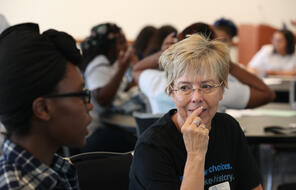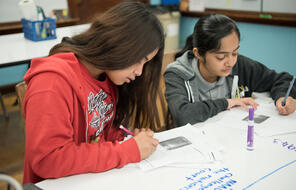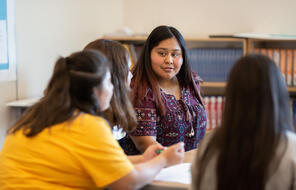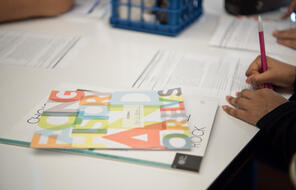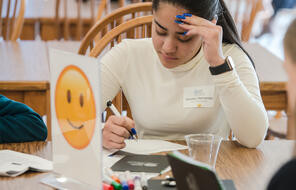We May Not Have Another Chance
At a Glance
Language
English — USSubject
- English & Language Arts
- History
- The Holocaust
Sonia Weitz was a young teenager in Poland when, in 1941, she and her family were forced to enter the Kraków ghetto. Her mother was taken from the ghetto and sent to the Belzec death camp, where she was killed. In 1943, Sonia, her older sister Blanca, and their father were sent to Płaszów, a slave labor camp south of Kraków.
During this time, Weitz kept a diary and wrote poetry. After the Holocaust, she continued to write as a way to cope with her emotions in the aftermath of the intense trauma she had experienced. In her book I Promised I Would Tell, she writes:
Although men and women lived in separate parts of the camp, the two groups did manage to have contact with each other. For example, on one occasion I was sent to the ghetto with a cleanup detail. While there I found a jacket, a precious warm jacket. I smuggled it back to Płaszów to my father. It was comforting to think that the jacket would keep him warm that winter. On another day, I sneaked into my father’s barracks on the other side of the barbed wire fence. While I was there, I met a boy who was about my age—14 or 15. The boy was playing a harmonica, an offense punishable by death. My father and I listened to the music, and my father said to me, “You and I never had a chance to dance together” . . . and so we danced. It is such a precious image, a bizarre and beautiful gift. 1
She also wrote a poem about this moment, which she called “Victory”:
I danced with you that one time only.
How sad you were, how tired, lonely . . .
You knew that they would “take” you soon . . .
So when your bunk-mate played a tune
You whispered: “little one, let us dance,
We may not have another chance.”
To grasp this moment . . . sense the mood;
Your arms around me felt so good
The ugly barracks disappeared
There was no hunger . . . and no fear.
Oh what a sight, just you and I,
My lovely father (once big and strong)
And me, a child . . . condemned to die.
I thought: how long
before the song
must end
There are no tools
to measure love
and only fools
Would fail
to scale
your victory. 2
Weitz and her sister were separated from their father soon after this moment. In December 1944, the two sisters were transferred to Auschwitz. They would never see their father again. The sisters were forced to march across Poland from Auschwitz to Bergen-Belsen, a concentration camp in Germany. They were later transferred to two other camps and at last liberated from Mauthausen, in Austria, in May 1945 by US troops.
Connection Questions
- Why do you think Sonia Weitz titled her poem “Victory”?
- How does reading the words of a Holocaust survivor add to your understanding of this history?
- How can writing help people to process emotions and trauma?
How to Cite This Reading
Facing History & Ourselves, "We May Not Have Another Chance," last updated August 2, 2016.
This reading contains text not authored by Facing History & Ourselves. See footnotes for source information.

